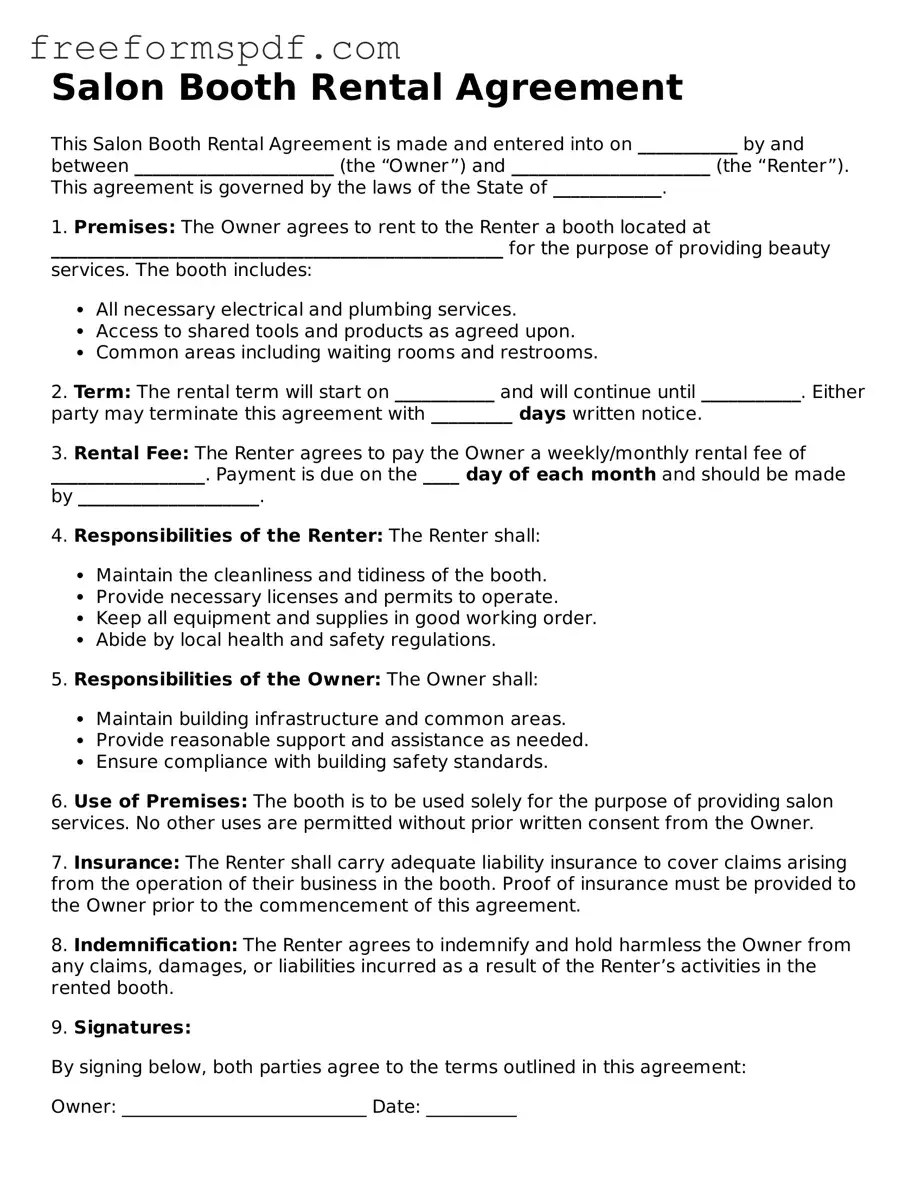Salon Booth Rental Agreement Document
Common mistakes
-
Incomplete Information: Many individuals fail to provide all required details. Missing names, addresses, or contact information can lead to delays or disputes.
-
Ignoring Terms and Conditions: Some people skip reading the entire agreement. This oversight can result in misunderstandings about responsibilities and obligations.
-
Incorrect Dates: Entering the wrong rental period is a common mistake. Double-check the start and end dates to avoid confusion later on.
-
Failure to Sign: It’s essential to sign the agreement. Without a signature, the document lacks validity, and it may not be enforceable.
-
Not Keeping a Copy: After filling out the form, some forget to keep a copy for their records. Always retain a signed copy for reference in case of disputes.
Learn More on This Form
-
What is a Salon Booth Rental Agreement?
A Salon Booth Rental Agreement is a legal document that outlines the terms and conditions under which a beauty professional rents a booth or space in a salon. This agreement specifies the responsibilities of both the salon owner and the renter, including rental fees, duration of the rental, and any rules that must be followed within the salon.
-
What should be included in the agreement?
Essential elements of the agreement typically include:
- The rental amount and payment schedule.
- The duration of the rental period.
- Details on shared expenses, such as utilities and supplies.
- Rules regarding salon operations and conduct.
- Termination conditions and notice requirements.
-
What are the benefits of using a Salon Booth Rental Agreement?
Using a Salon Booth Rental Agreement offers numerous advantages. It protects both parties by clearly defining expectations and responsibilities. This clarity can prevent misunderstandings and disputes down the line. Additionally, having a written agreement establishes a professional relationship, which can enhance trust and cooperation between the salon owner and the renter.
-
How can I ensure the agreement is legally binding?
To make the agreement legally binding, both parties should sign the document. It’s advisable to have the agreement reviewed by a legal professional to ensure it complies with local laws. Additionally, both parties should retain a copy of the signed agreement for their records.
-
What happens if either party wants to terminate the agreement early?
The agreement should specify the conditions under which either party can terminate the contract early. Typically, this includes a notice period that must be given, which allows both parties to prepare for the change. If one party fails to adhere to these terms, it may lead to potential legal consequences.
Misconceptions
When it comes to Salon Booth Rental Agreements, several misconceptions can lead to confusion for both salon owners and booth renters. Here are eight common misunderstandings:
- It’s just a simple handshake agreement. Many believe that a verbal agreement is sufficient. However, having a written contract protects both parties and clarifies expectations.
- All booth rental agreements are the same. Each agreement can vary significantly based on the salon’s policies and the terms negotiated between the owner and renter. Customization is key.
- Once signed, the agreement can’t be changed. While the agreement is binding, it can be amended if both parties agree to the changes in writing.
- Booth renters are independent contractors, so they have no responsibilities. Renters still have obligations, such as maintaining the space and adhering to salon policies.
- Renters can set their own prices without restrictions. Often, salon owners have guidelines regarding pricing to ensure consistency and maintain the salon's reputation.
- There are no legal implications if the agreement isn’t followed. Failing to adhere to the terms can lead to legal disputes, including potential eviction or financial penalties.
- Insurance is not necessary for booth renters. In reality, renters should carry their own liability insurance to protect themselves and the salon from potential claims.
- Only the salon owner needs to sign the agreement. Both parties should sign the contract to ensure that everyone is on the same page and legally bound to the terms.
Understanding these misconceptions can lead to a more successful and harmonious working relationship between salon owners and booth renters. Clear communication and a well-structured agreement are essential for everyone involved.
Other Types of Salon Booth Rental Agreement Forms:
Hunting Lease Agreement Example - Outlines procedures for terminating the lease agreement if necessary.
Letter to Increase Rent - A notification meant to clarify new pricing for leases.
It's essential for both landlords and tenants to understand the importance of a well-drafted lease agreement, as it provides clarity and protection for both parties. For those looking to establish a rental agreement in Arizona, you can access the necessary documentation at arizonaformspdf.com/lease-agreement-form, ensuring that all legal requirements are met and your rights are safeguarded.
Wedding Venue Contract - Address the policy regarding catering services and food-related arrangements.
